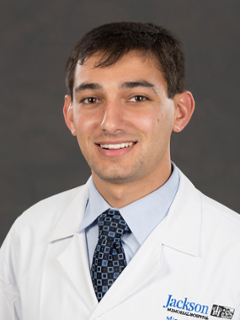 “We are working towards the development of health-related quality of life interventions to ameliorate the burden of pancreatic cancer in our patients,” says postdoctoral scholar Joshua Kronenfeld. During his time as a postdoc in oncology research at the Miller School of Medicine, Joshua has focused on various disparities seen in sociodemographic minorities. By understanding disparities such as access to health insurance, he is able to assist in developing innovative strategies in order to improve the care delivered to patients at the University of Miami. For example, his project in one of the most common types of primary liver cancer known as hepatocellular carcinoma, determined differences in presenting stage and symptoms for patients who did not have access to primary care physicians. Providing these patients screening services led to these patients presenting earlier and prevented patients from being seen later with more advanced-stage disease.
“We are working towards the development of health-related quality of life interventions to ameliorate the burden of pancreatic cancer in our patients,” says postdoctoral scholar Joshua Kronenfeld. During his time as a postdoc in oncology research at the Miller School of Medicine, Joshua has focused on various disparities seen in sociodemographic minorities. By understanding disparities such as access to health insurance, he is able to assist in developing innovative strategies in order to improve the care delivered to patients at the University of Miami. For example, his project in one of the most common types of primary liver cancer known as hepatocellular carcinoma, determined differences in presenting stage and symptoms for patients who did not have access to primary care physicians. Providing these patients screening services led to these patients presenting earlier and prevented patients from being seen later with more advanced-stage disease.
“This finding suggests that access to insurance, particularly plans that cover procedures such as surgical resections and liver-directed therapies, is essential to bridging the survival gap in underserved patients,” says Joshua. One of the projects that he is currently working on is a prospective study to investigate the quality of life and gastrointestinal outcomes of patients undergoing pancreatic cancer treatments. This research focuses on providing therapy at various points during a patient’s treatment, such as at diagnosis, during chemotherapy, and prior to and after surgery. The project involves designing cognitive behavioral therapy and stress-reducing intervention modules to improve symptoms during oncologic care. He hopes to be able to identify the ideal time-point and place within treatment to yield optimal results.
Joshua’s research has afforded him the opportunity to present at numerous national meetings and to publish findings in peer-reviewed journals among other publications. During his fellowship, he hopes to identify and help resolve the disparities in the patients served and work towards decreasing the psychosocial burden brought on by the diagnosis and treatment of pancreatic cancer. Joshua states, “I am excited to have the opportunity to impact patient care through the discovery of innovative findings and implementation of new programs.”
